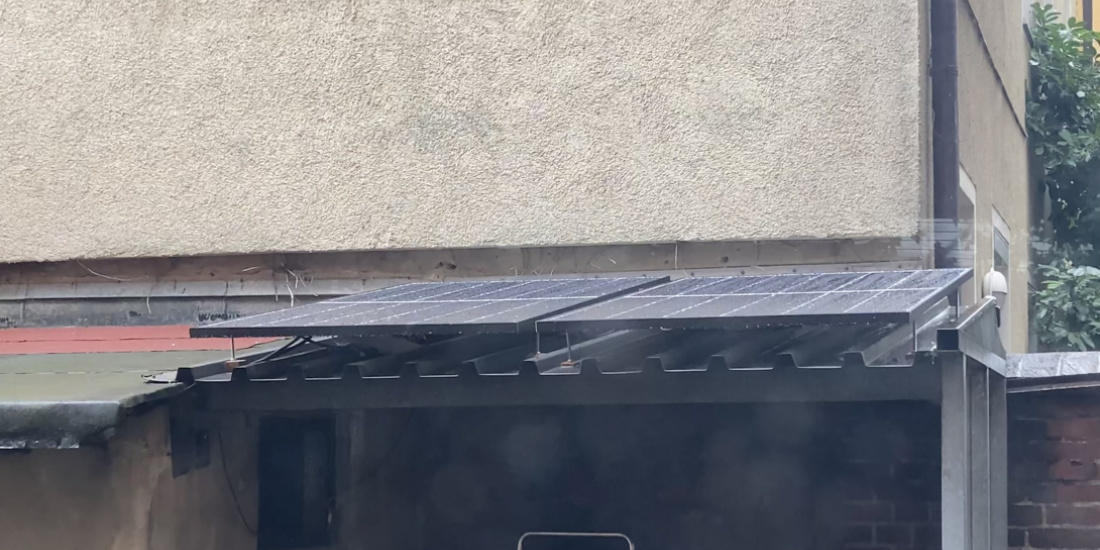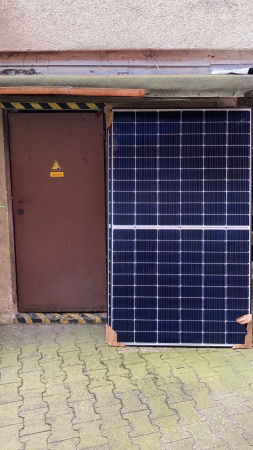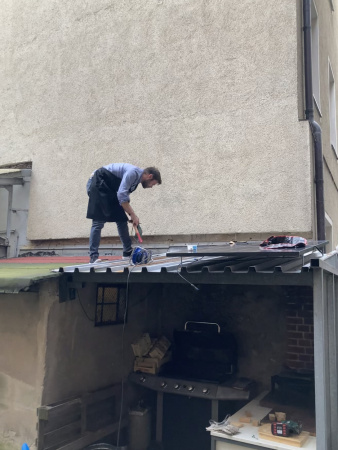So that the millions of rental households can actively participate in the energy turnaround, we within the scope of our company participation in indielux GmbH are developing practical solutions for the balcony solar product category. Our Managing Director Markus Vietzke - who was awarded the Georg Salvamoser Prize 2018 as a "Hero of the Energy Turnaround" - played a key role in driving forward the revision of the DIN standards and application rules (VDE 0100-551 and VDE-AR-N 4105) of the Association for Electrical, Electronic & Information Technologies that are necessary for this. These define the requirements for parallel and decentralised generation systems on the low-voltage grid. This was a decisive step for the rapidly growing market of balcony power plants, which, by the way, are also called mini-solar systems, plug-and-play solar systems, citizen solar systems, solar sockets or balcony modules. Or even plug-in solar units.
Very simple
Typically, with such plug-in solar devices, up to 2 photovoltaic (PV) modules are connected directly to one's own circuit with an inverter. This does not have to be done by an electrician, but is expressly intended for use by laypersons. The familiar Schuko plug is often used as a simple transfer connection. However, the previous electrical installation should first be professionally checked. This can be dispensed with if automatic circuit breakers or screw-type fuses are available and no more than 600 watts are operated.
Compulsory registration!
Since it has unfortunately not yet been conclusively clarified whether pluggable solar devices are fixed installations, the balcony module should definitely be registered with the Federal Network Agency. This can be done free of charge at https://www.marktstammdatenregister.de. (This procedure can take up to 30 minutes.) Important: Know the name of your grid operator - this is not your electricity provider!
Meter exchange?
Basically, the plug-in solar unit is used for self-consumption. The self-produced electricity is cheaper than the purchased electricity. Even if it is not problematic to feed the electricity you do not consume yourself into the public grid to a small extent, you should optimise it so that ideally there is zero feed-in. If this is not guaranteed, an electricity meter with a backflow preventer can put you on the safe side. Apropos: Household appliances always automatically use the electricity from the solar device first and then supplement it with mains electricity.
Our indielux Watt calculator
Together with the University of Applied Sciences (HTW) Berlin, we have developed the Wattage calculator over the last few months. With it, you can check for yourself whether you are one of the households that can produce about 10 % of their own electricity for around 8 cents/kWh. Unfortunately, I myself have an absolutely unsuitable north-facing balcony and would only install it out of passion. But we have already done that at our office. We affectionately call the location "scattered light harvest".
Example of a solar module
Because we are asked again and again how big such a PV-module actually is, we took a photo before the assembly.
Yes, our model is bigger than the door :) The dimensions are 1.70 by 1.10 m at about 20 kg per piece.
Of course, there are many other types. They differ not only in terms of dimensions, but also in terms of material, number, size and efficiency of the solar cells applied. And ultimately, the choice depends on the available surface area anyway.
Climate protection in the home
If you still have questions about electrical safety, the specific information in the FAQs of the German Solar Energy Society Berlin can help you. In addition to technical tips, there are also detailed legal tips. Because some grid operators continue to try to prevent their customers from choosing alternatives. And you don't have to put up with that.
By the way, our Watt calculator tells you the annual savings and the respective payback period for the different options. You will win in any case - regardless of the financial return: because with a comparatively small investment you are practically doing something against climate change!



